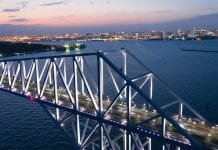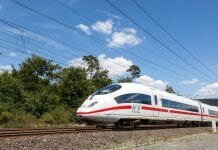
One of Europe’s largest railway manufacturers, Alstom transport has officially rolled out its hydrogen trains in Lower Saxony, Germany.
Equipped with fuel cells which convert hydrogen and oxygen into electricity, the Coradia iLint, built by Alstom transport in Germany, eliminates pollutant emissions related to propulsion.
Officially entering commercial service
Not only Alstom, but the Minister of Economy and Transport of Lower Saxony, the Federal Ministry of Transport and the transport authorities of Landesnahverkehrsgesellschaft Niedersachsen (LNVG) and Eisenbahnen und Verkehrsbetriebe Elbe-Weser (EVB) all celebrate in awe.
These newly designed trains will now enter commercial service according to a fixed timetable in Lower Saxony.
For the time being, it is travellers in EVB’s Elbe-Weser network who can look forward to a world-first journey on the low-noise, zero-emission trains that reach up to 140 km/h.
The Coradia iLint trains will be operated on nearly 100km of line running between Cuxhaven, Bremerhaven, Bremervörde and Buxtehude, replacing EVB’s existing diesel fleet.
Fuelled at a mobile hydrogen filling station, the gaseous hydrogen will be pumped into the trains from a 40-foot-high steel container next to the tracks at Bremervörde station. With one tank, they can run throughout the network the whole day, thanks to a total autonomy of 1000 km.
Alstom transport are said to deliver a further 14 Coradia iLint trains to LNVG. Therefore, creating a stationary filling station on EVB premises, which is scheduled to go into operation in 2021.
Henri Poupart-Lafarge, Chairman and CEO of Alstom emphasise: “This is a revolution for Alstom and for the future of mobility. The world’s first hydrogen fuel cell train is entering passenger service and is ready for serial production. The Coradia iLint heralds a new era in emission-free rail transport. It is an innovation that results from French-German teamwork and exemplifies successful cross-border cooperation.”
“A climate friendly alternative to conventional diesel trains”
Dr. Bernd Althusmann, Lower Saxony’s Minister of Economy and Transport, whose department has supported LNVG’s purchase of another 14 hydrogen trains with more than €81 million, adds: “with the test operation starting today, Lower Saxony is performing real pioneering work in local transport in cooperation with Alstom and EVB.
“The emission-free drive technology of the Coradia iLint provides a climate-friendly alternative to conventional diesel trains, particularly on non-electrified lines”.
Althusmann further explains: “in successfully proving the operability of the fuel cell technology in daily service, we will set the course for rail transport to be largely operated climate-friendly and emission-free in the future. The state government of Lower Saxony is proud of putting this trendsetting project on the track together with LNVG.”
By providing funds from the National Innovation Programme for Hydrogen and Fuel Cell Technology, the federal government has actively supported the development and testing of the new drive technology in Lower Saxony.
“A world premiere in Germany.” Says Enak Ferlemann, Federal Government Commissioner for Rail Transport and Parliamentary State Secretary of the Federal Ministry of Transport and Digital Infrastructure.
“We are putting the first passenger train with fuel cell technology on the track. This is a strong sign for the mobility of the future.”
“Hydrogen is a real, low-emission and efficient alternative to diesel. These trains can be operated cleanly and in an environmentally friendly way, especially on secondary lines where overhead lines are uneconomical or not available yet.” Ferlemann added: “we therefore support and fund this technology, in order to expand it.”
With around 2 million rail passengers and around 4 million bus passengers per year, EVB figures among the largest mobility providers in the Elbe-Weser triangle. The traditional company, which boasts a history of more than 100 years and around 550 employees, is looking forward to the “train of the future”.
Dr. Marcel Frank, Managing Director of EVB, concludes: “it is a great milestone that we will use the world’s first hydrogen-powered train in our Elbe-Weser network in passenger service.”
“For EVB, this is the entry to emission-free mobility.”


















